|
|
 | I'm for the hippopotamus |  |
|
| Io sto con gli ippopotami
|
| Italy 1979 - 96 Min. |
| Show international titles |
 |
| Summary |
|
Slim returns to his home village in Africa after a long absence. Once there, he shoots at the tyres of the jeep of his cousin Tom, who is currently on a hunting safari. Tom himself is an animal friend and therefore he only organises hunts with blank cartridges, as he has sworn to hunt animals never again. Tom is naturally angry with Slim, but after Slim has paid for the damage, the dispute is buried immediately and both decide to become partners. Since Tom thinks Slim has gotten some money in the meantime, he buys a new bus for his safaris on credit. When it becomes clear that Slim has no money at all, other methods of raising money have to be found. The cousins repeatedly get into conflict with the people of Mr. Ormond, an unscrupulous businessman who hunts animals to sell them to foreign countries. He also wants to drive the natives from their land. When the resistance of the cousins becomes too much for Mr. Ormond, he invites them to a meal and tries to bribe them. Of course, the cousins doesn't respond. Mr. Ormond then tries to kill the two cousins and after this fails he tries to put them in prison with a fictitious trial. However, Slim can escape and a little later he frees his cousin as well. Together they start to free the animals captured by Ormond and prevent their transport to cold Canada. On the ship chartered by Mr. Ormond for the transport it comes finally to the large showdown.
After appearances in Europe, South America and North America, Bud Spencer and Terence Hill are now going to Africa for the first time. Together it is also their only performance on the African continent.
"I'm for the hippopotamus" was supposed to be Giuseppe Colizzi's fifth director's work on a Spencer/Hill movie, but unfortunately Colizzi died shortly before the shooting started. Italo Zingarelli, who already knew Bud Spencer and Terence Hill through his work as producer of "The Five Man Army", "They call me Trinity", "Trinity Is still My Name" and "All The Way, Boys", took his seat on the director's chair instead.
Since all scenes of the film were shot in South Africa, none of the usual stuntman and supporting actors can be seen in this film. The only exception is Marcello Verziera, who can only be seen very briefly in the film, but who had an advisory function behind the scenes.
Instead of the usual bad guys there are three boxers or wrestlers this time. The well known Joe Bugner, who plays the villian Mr. Ormond in an inimitable way, has as his henchmen heavyweight boxer Mike Schutte and professional wrestler Malcolm "King Kong" Kirk at his side.
In "I'm for the hippopotamus" Terence Hill gets the chance to perform his feared card tricks again. As with all his similar scenes in the previous movies, Hill's hands were again doubled by card artist Tony Binarelli. Binarelli himself even has an appearance in front of the camera this time. He plays the player with the eye patch, who loses his money against Hills fast eye on the market place.
The soundtrack was written by Walter Rizzati, who wrote the music for a Spencer/Hill film only this time. The very catchy title song "Grau grau grau" is sung by Bud Spencer himself. The title song and also a complete soundtrack album were released on vinyl in 1979 in various countries, e.g. Italy, France and Germany. Meanwhile the complete soundtrack is also available on CD.
The soundtrack offers a curiosity, as Bud Spencer recorded the title song in a German version in 1979. The German version is called "Fauch Fauch Fauch" and was also released as a single in 1979. Bud Spencer was vocally supported in this version by the young singer Anke von Ohlen.
The German dubbed version of the film was made by Rainer Brandt in Berlin. Brandt wrote the dialogues himself and also directed the dialogue. Terence Hill is spoken as usual by Thomas Danneberg, Arnold Marquis is heard on Bud Spencer this time.
The German cinema version is shortened by approx. 9 minutes compared to the Italian original version. In the meantime, however, the uncut version has also been published in Germany. The previously undubbed scenes are available on this publication in their original language with German subtitles. The shortened German cinema version will therefore continue to be shown on television.
Bud Spencer visited Germany shortly after the release and presented the film on January 17, 1980 in the ZDF show "Der große Preis" with showmaster Wim Thoelke.
The film was awarded the "Golden Screen" (Goldene Leinwand) in 1980 for over 3 million cinema-goers in Germany. In the end, more than 5.3 million viewers watched the film in German cinemas.
The film was shot in South Africa.
Runtimes:
German DVD (cinema version): 95:32 minutes
German DVD (uncut version): 104:24 minutes
|
| Release Dates: |
| 01.12.1979 |
Spain |
Premiere |
1.336.197 Besucher |
| 05.12.1979 |
France |
Premiere |
2.251.095 Besucher |
| 13.12.1979 |
Germany |
Premiere |
5.350.000 Besucher |
| 21.12.1979 |
Finland |
Premiere |
134.608 Zuschauer |
| 25.05.1985 |
Germany |
Television premiere |
ZDF |
| 28.05.1987 |
Hungary |
Premiere |
1 314 153 db jegy kelt el |
| 26.12.1988 |
Germany |
Television premiere |
DDR |
|
 |
| Show additional summaries |
 |
| to top |
 |
| Cast |
|
|
 |
| Show gallery with pictures of unknown actors |
 |
| to top |
 |
| Crew |
| Music |
| Bud Spencer (Gesang des Titelsongs), Walter Rizzati
|
| Writer |
| Amedeo Pagani (Soggetto e sceneggiatura), Barbara Alberti (Soggetto e sceneggiatura), Italo Zingarelli (Soggetto e sceneggiatura), Nino Longobardi (Soggetto), Vincenzo Mannino (Sceneggiatura)
|
| Master of Arms |
| Giorgio Ubaldi (Maestro d'armi), Remy Julienne (Consulenza stunt cars)
|
| Director of Photography |
| Aiace Parolin (Direttore della fotografia; als Ajace Parolin), Vincent G. Cox (a.s.c.; Direttore fotografia 2' unità), Ivo Pellegrini (Operatori alla macchina), Igino Fiorentini (Operatori alla macchina), Mike Buckley (Assistenti operatori), Theo Theron (Assistenti operatori), Umberto Adaggi (Fotografo di scena)
|
| Editor |
| Claudio Cutry (Montaggio), Ernesto Triunveri (Assistenti al montaggio), Alfredo Menchini (Assistenti al montaggio)
|
| Art Direction |
| Francesco Bronzi (Scenografia)
| | Costumes |
| Luciano Sagoni (Costumi di), Ida Cristofori (Sarta - Wardrobe mistress), Maria Conti (Wardrobe assistants), Sandy Hyde (Wardrobe assistants)
| | Make up |
| Luciano Giustini (Truccatore), Linda Robertson (Assistant make-up)
| | Hair stylist |
| Fausto De Lisio (Parrucchiere)
| | Dialogcoach |
| Raffaele Mottola (Dialogue coach; als Ray Mottola)
| | Sound |
| Fred Ridgard (Fonico), Tony Bensusan (Microfonista)
| | Requisite |
| Graeme Orwin (Attrezzisti - Props master), Antonio De Campos (Attrezzisti - Props assistants), Patrick Willis (Attrezzisti - Props assistants)
| | Tierdressur |
| Hans Otto (Consulenza scene animali), Guido Otto (Consulenza scene animali), Eric Nordh (Consulenza scene animali), Janet Nordh (Consulenza scene animali), Jack Seale (Consulenza scene animali)
| | Kartentricks |
| Tony Binarelli (Consulenza giochi)
| | Production company |
| Denver Film Productions, Zadar Film
| | Assistant director |
| Renzo Marignano (Aiuto regista), David Bensusan (Assistente regia)
|
| Producer |
| Roberto Palaggi (Produttore esecutivo), Ezio Palaggi (Direttore di produzione), Paolo Tassara (Ispettore di produzione), Rosella Colombo (Segretaria di produzione), Fred Swart (Ass. produzione 1' unità), Dennis van der Merwe (Ass. produzione 2' unità), Margareth Sorgarello (Cassiera amministratrice), Carol Joseph (Cassiera), Vincent G. Cox (a.s.c.; Production line producer)
|
| Director |
| Italo Zingarelli
|
|
| to top |
 |
| This movie can be found on following media |
|
|
| to top |
 |
| Soundtracks |
|
|
| to top |
 |
| Posters |
Belgium
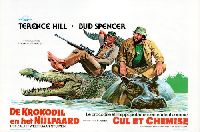 |
Danmark
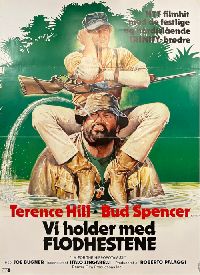 |
Germany
 |
Germany
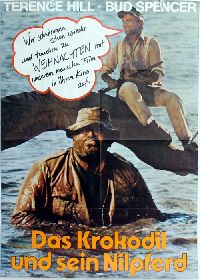 |
Germany
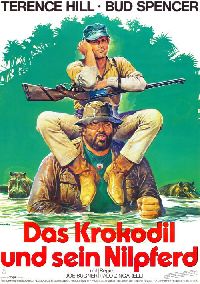 |
Germany
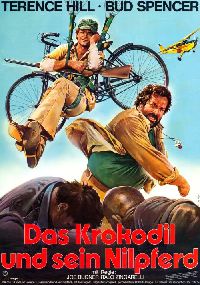 |
Italy
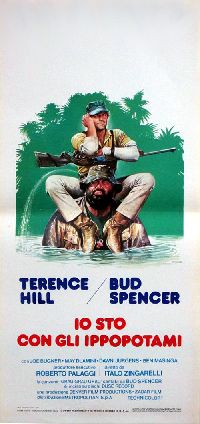 |
Italy
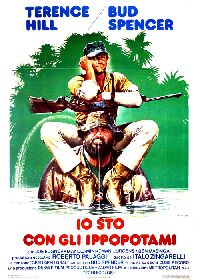 |
Yugoslavia
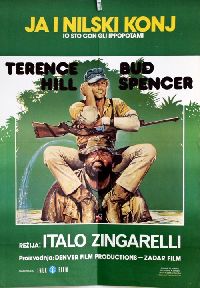 |
Spain
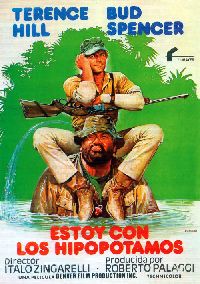 |
Thailand
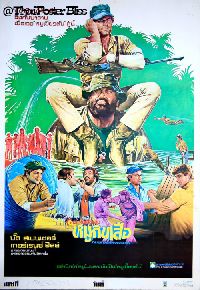 |
Hungary
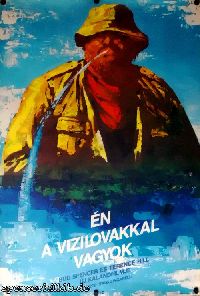 |
|
|
| to top |
 |
| This movie page was visited 100759 times. |
| | |
